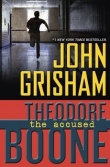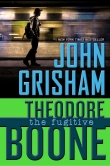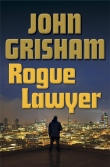
Текст книги "Gray Mountain"
Автор книги: John Grisham
Соавторы: John Grisham
Жанры:
Политические детективы
,сообщить о нарушении
Текущая страница: 22 (всего у книги 27 страниц)
31
Jeff began the New Year with a bang by getting himself arrested at the airport in Charleston, West Virginia. Around 10:00 p.m. on the first Sunday of the year, a guard strolling through the general aviation area noticed a man attempting to hide in the shadows of a Beech Bonanza, near several other small aircraft. The guard pulled a gun and ordered the man, Jeff, to step away from the airplane. The police were called. They put handcuffs on him and took him to jail. He called Samantha at six the following morning, but just for an update. He was not expecting her to come to the rescue because he had lawyer friends in Charleston. She asked the obvious: “What were you doing snooping around the airport on a Sunday night?”
“Investigating,” he said. Someone was yelling in the background.
She shook her head in frustration at his recklessness. “Okay, what can I do?”
“Nothing. It’s just trespassing. I’ll be out in a few hours. I’ll call.”
Samantha hurried to the office and made the coffee before 7:00 a.m. She had little time to worry about Jeff and his latest adventure. She reviewed her notes, organized a file, poured a cup of coffee for the road, and at 7:30 took off for Colton, a one-hour drive in which she rehearsed her arguments with the judge and the lawyer for Top Market Solutions.
She walked into the Hopper County courthouse, alone. Gone were the days when either Mattie or Annette led interference. She was on her own now, at least for the Booker case. Pamela met her in the hallway and thanked her again. They entered the courtroom and sat at the same table where Donovan Gray had sat with Lisa Tate less than three months earlier, the same spot where they had held hands as the jury returned a just verdict. It was not lost on Samantha that in all likelihood she would be involved in the appeal of that verdict. But not today. Today they were not fighting over anything close to $3 million. Five thousand was more like it, but, judging from Samantha’s nerves, it could have been millions.
The judge called them to order and asked Samantha to proceed. She breathed deeply, looked around, saw that there were no spectators, reminded herself that it was a simple case over a paltry sum, and plowed ahead. She made some brief opening remarks, and called Pamela to the witness stand. Pamela described the old credit card judgment, identified the divorce decree, described what it was like to have her paycheck garnished and her job terminated, and did a beautiful job of talking about living with her two children in her car. Samantha produced certified copies of the credit card judgment, the divorce decree, the garnishment order, and payroll records from the lamp factory. After an hour on the stand, Pamela returned to counsel table.
Top Market Solutions had a weak defense and an even weaker lawyer. His name was Kipling, a low-end litigator from a two-man firm in Abingdon, and it was obvious Kipling had little enthusiasm for the facts or for his client. He rambled on about how Top Market had been deceived by the credit card company and had acted in good faith. His client had no idea the judgment it was trying to enforce had expired.
The judge had no patience with Kipling and his ramblings. He said, “Your motion to dismiss is overruled, Mr. Kipling. Now, let’s go off the record.” The court reporter relaxed and reached for a coffee cup. The judge said, “I want this matter settled, and now. Mr. Kipling, it’s obvious your client has made a mistake and caused a lot of discomfort to Ms. Booker. We can have a full-blown trial in a month or so, right here, in front of me, no jury, but that would be a waste of time because I’ve already decided the case. I assure you it will cost your client less now if it agrees to settle.”
“Well, uh, sure, Your Honor,” Kipling stuttered, on his heels. It was highly unusual for a trial judge to be so blunt about a future ruling.
“Here’s what I think is fair,” the judge said. In other words, here’s what my ruling will be. “Your client unlawfully garnished Ms. Booker’s paychecks, eleven of them, for a total of $1,300. She was kicked out of her trailer because of this. Your client was directly responsible for her getting fired, though I understand she was able to regain her job. Nevertheless, she went through desperate times and ended up homeless and living in her car with her two children. All because of your client. Ms. Booker is entitled to damages for this. She has demanded $5,000 in her lawsuit, but that seems a bit low. If I decided the case today, I would award the $1,300 in lost wages, plus another $10,000 for damages. If I decide the case next month, I assure you this will seem like a bargain. What do you say, Mr. Kipling?”
Kipling was huddled up with his client, a representative to Top Market, a red-faced little stump of a man in a cheap, tight suit. He was furious and sweating, but he could also grasp what was happening. It was obvious the lawyer and the client did not trust one another. Finally, Kipling said, “Could we have five minutes, Your Honor?”
“Sure, but only five.”
They stomped out of the courtroom.
Pamela leaned over and nervously whispered, “I can’t believe this.”
Samantha nodded smugly as if it were just another day in court. She pretended to be captivated by a document, frowning and underlining some terribly important words, while wanting to yell, “I can’t believe it either. This is my first trial!”
Of course, it really wasn’t a trial, but more of a hearing. But it was her first lawsuit, and to win in such a slam-dunk fashion was thrilling.
The main door opened and they stomped back to their table. Kipling looked at the judge and said, “Your Honor, well, uh, well it looks like my client made some mistakes and is truly sorry for all the trouble it caused. What you suggested is a fair settlement. We’ll take it.”
Samantha floated back to Brady. She thought of Donovan and Jeff after the Tate verdict, floating back to town with a $3 million verdict in their pocket. They could not have been more excited and overwhelmed than Samantha at that moment. She and her colleagues had rescued the Bookers from homelessness, even starvation, and returned them to a normal life. They had pursued justice with determination, and found it. The bad guys had been thoroughly routed.
As a lawyer, she had never felt so worthy. As a person, she had never felt so needed.
Monday’s brown-bag lunch was spent celebrating Samantha’s crushing victory in her first lawsuit. Annette advised her to savor the moment because victories were rare in their business. Mattie cautioned her about celebrating too soon; the check had not yet been received. Once they rehashed the Booker case, the conversation drifted to other matters. Mattie reported that Jeff was out of jail in Charleston. Did he post a bond or did he escape? Samantha asked. A prominent lawyer there, one of Donovan’s pals, secured his release. No, he did not elaborate on his alleged crime.
Annette received an off-the-record call that morning from a clerk in the courthouse, alerting her to the possibility that an unnamed lawyer for the Crump family planned to file a petition to probate the prior will of Francine Crump, one she had signed five years earlier, and presumably the one she had shown Samantha. The family was claiming the prior will was valid because Francine had destroyed the later will, the free one prepared by the clinic. It was a looming mess that no one around the table wanted to jump into. Let the Crumps have their land and sell it to a coal company; they didn’t care. However, as Mattie explained, as lawyers they were officers of the court, and thereby duty-bound to prevent, if possible, a fraud. They had the original free will, mailed to them by some mysterious person after Francine was felled by a stroke. She had not destroyed it; indeed, she was hiding it from her children and wanted the clinic to protect it, and to probate it. Should they produce the will now, and start a war that would rage for several years? Or should they wait and see what the Crumps alleged? There was a good chance the family would continue with its lying about Francine’s destruction of the will. If these lies were told under oath, and then exposed, there could be serious implications for the family. In all likelihood, they were walking into a trap, one that the clinic could avoid by producing the will now.
It was a legal quagmire, a classic law school exam question, designed to drive students insane. They decided to wait another week, though all three lawyers, along with Claudelle and Barb, knew the will should be produced and the family alerted.
A heavy snowfall was expected to begin late in the afternoon, and they discussed the office contingencies. Mattie, Annette, and Samantha usually walked to work anyway, so the clinic would be open. Claudelle was eight months pregnant and would not be expected to show up. Barb lived deep in the countryside on a road that was seldom plowed.
By 3:00 p.m. the snow was already falling. Samantha was watching it from her desk, daydreaming and avoiding her files, when the prepaid phone buzzed in her purse. Jeff said he was still in the Charleston area. “How was jail?” she asked.
“Be careful what you say,” he said.
“Oh right, I forgot.” She stood and walked to the front porch.
He said he entered the ramp at the general aviation section of the airport by an unlocked gate in a chain-link fence. The small terminal was open but only a clerk was there, a young girl sitting at a desk flipping through tabloid magazines. From the shadows he watched the area for half an hour and saw no movements. In the distance, at the main terminal, there were a few flights, but nothing involving small aircraft. There were thirteen airplanes tied down on the ramp, including four Skyhawks. Two were unlocked, and he crawled inside one and sat in the darkness for ten minutes.
In other words, there was virtually no security. He could have tampered with any of the airplanes on the ramp. Then he saw a guard and decided to get arrested. It was only trespassing, a misdemeanor. He’d had more serious charges, he reminded her. The guard was nice and Jeff turned on the charm. He said he was a pilot and had always dreamed of owning a Beech Bonanza; he just wanted to see one up close. No harm intended. The guard believed him and was sympathetic, but he had a job to do.
Jail was no big deal. The lawyer would take care of things.
But while he was chatting up the guard, he asked about other guards who had worked there, other guys on the ramp who may not be around now. He got one name, a man who quit before Christmas, and he was tracking him down now.
She closed her eyes and told him to be careful. She also knew he would spend the rest of his life trying to find the men who killed his brother.
The thrill of litigation was tempered somewhat two days later when Samantha accompanied Mattie to a black lung hearing before an administrative law judge (ALJ) in the federal courthouse in Charleston. The miner, Wally Landry, was fifty-eight years old and had not worked in seven years. He was hooked to oxygen and confined to a wheelchair. Fourteen years earlier, he had filed a claim for black lung benefits based on a doctor’s report that he was suffering from complicated black lung disease. The district director of the Department of Labor awarded him benefits. His employer, Braley Resources, appealed to the ALJ, who suggested to Mr. Landry that he find an attorney. Mattie eventually agreed to represent him. They prevailed before the ALJ, and Braley appealed to the Benefits Review Board (BRB) in Washington. The case bounced back and forth between the ALJ and the BRB for five years before the BRB issued a final ruling in Landry’s favor.
The company appealed the ruling to the federal Court of Appeals where it sat for two years before being remanded back to the ALJ. The ALJ requested additional medical evidence and the experts went to war, again. Landry had started smoking at the age of fifteen, quit twenty years later, and as a smoker got hammered with the usual barrage of medical opinions stating that his lung problems were caused by tar and nicotine and not coal dust.
“Anything but coal dust,” Mattie said over and over. “That’s always their strategy.”
Mattie had worked on the case for thirteen years, had 550 hours invested, and if she ultimately prevailed would have to fight to get approved at $200 an hour. The fee would be paid by Braley Resources and its insurance company, whose lawyers charged far more than $200 an hour. On those rare occasions when the clinic collected a fee in a black lung case, the money went into a special account that helped cover the expenses of future black lung cases. As of now, that fund had about $20,000 in it.
The hearing took place in a small courtroom. Mattie said it was at least the third time they had all gathered there to rehash the contrasting medical opinions. She and Samantha sat at one table. Not far away, a fashionable gang of sharply dressed lawyers from Casper Slate busily unpacked their thick briefcases and went about their work. Behind Samantha was Wally Landry, shriveled and breathing through a tube in his nose, his wife at his side. When Wally first filed his claim fourteen years earlier, he’d been entitled to $641 a month. The legal fees paid by Braley at that time amounted to at least $600 an hour, according to Mattie’s off-the-cuff calculations, but don’t try and make sense of it, she said. The legal fees paid by coal companies and their insurers far exceed the benefits they’re fighting to avoid, but that’s beside the point. The hurdles and delays discourage other miners from filing claims, and they certainly scare off the lawyers. In the long run, the companies win, as always.
A slick-rick in a black suit sauntered over to their table and said, “Well, hello, Mattie. Nice to see you again.” Mattie reluctantly got to her feet, offered a limp hand, and said, “Good morning, Trent. Always a pleasure.”
Trent was about fifty with graying hair and confident looks. His smile was drippy and fake, and when he said, “So sorry about your nephew. Donovan was a fine lawyer,” Mattie quickly withdrew her hand and snapped, “Let’s not talk about him.”
“Sorry, of course not. And who is this?” he asked, looking at Samantha. She was on her feet and said, “Samantha Kofer, an intern with the clinic.”
“Ah, yes, the brilliant investigator who dug through the Ryzer records. I’m Trent Fuller.” He extended a hand but Samantha ignored it.
“I’m a lawyer, not an investigator,” she said. “And I represent Mr. Ryzer in his claim for black lung benefits.”
“Yes, so I’ve heard.” The smile vanished as his eyes narrowed and flashed with hatred. He actually pointed a finger at her as he spoke. “We deeply resent the allegations made against our law firm by your client in his ill-fated lawsuit. Don’t make that mistake again, I’m warning you.” His voice increased in volume as he lectured her. The other three suits from Castrate froze and glared at her.
Samantha was stunned, but there was nowhere to hide. “But you know the allegations are true,” she said.
He took a step closer, jabbed his finger in her face, and said, “We’ll sue you and your client for libel, do you understand?”
Mattie reached forward and gently shoved his hand away. “That’s enough, Trent, go back to your box.”
He relaxed and offered the same drippy smile. He kept glaring, though, and with a lower voice said to Samantha, “Your client caused us great embarrassment, Ms. Kofer. Even though that lawsuit has been dismissed, it still stings. His black lung claim will get the full treatment in our firm.”
“Don’t they all?” Mattie snapped. “Hell, this one’s been on the docket for fourteen years and you’re still fighting it tooth and nail.”
“That’s what we do, Mattie. That’s what we do,” he said proudly, backing away and returning to his fan club.
“Take a breath,” Mattie said as they sat down.
“I’m not believing this,” Samantha said, stunned. “I got threatened in open court.”
“Oh, you haven’t seen anything yet. They’ll threaten you in court, out of court, in the hallways, on the phone, by e-mail, fax, or in court filings. Doesn’t matter. They’re bullies and brutes, just like their clients, and for the most part they get away with it.”
“Who is he?”
“One of their more talented assassins. A senior partner, one of six in their black lung division. About a hundred associates, dozens of paralegals, and all the support staff they need. Can you imagine Wally Landry sitting here without a lawyer?”
“No.” That visual seemed so far-fetched that it had to be illegal.
“Well, it happens all the time.”
For a split second Samantha longed for the strength and security of Scully & Pershing, a firm four times as big as Casper Slate and far wealthier. No one bullied the litigators at her old firm; indeed, they were often regarded as the bullies. In a dogfight, they could always send in another pack of wolves to protect their clients.
Trent Fuller would never consider such an altercation with lawyers from another big firm. He swaggered over because he saw two women at the table, two ill-paid legal aid lawyers representing, pro bono, a dying miner, and he felt unrestrained in throwing his weight around. The audacity was astonishing: his firm was guilty of fraud and conspiracy, and had been caught red-handed by Samantha and exposed when Donovan filed the Ryzer lawsuit. Now that the lawsuit was gone, Fuller and his firm were not at all concerned with their own wrongdoing. Of course not—they were worried only about their tarnished image.
Nor would Fuller have ventured over and caused trouble had Donovan been there. Indeed, none of the four pretty boys at the other table would risk getting punched because of a stray word or idle threat.
They were women, viewed by the boys as easily intimidated and physically vulnerable. They were fighting a losing cause and not getting paid for it; therefore, they were obviously inferior.
Samantha stewed as Mattie shuffled papers. The judge took his place and called things to order. Samantha glanced across the courtroom and again caught Fuller staring at her. He smiled as if to say, “This is my turf, and you don’t belong here.”
32
The e-mail read:
Dear Samantha: I enjoyed our brief meeting in New York and look forward to another conversation with you. Yesterday, Jan 6, Krull Mining filed a motion to dismiss our Hammer Valley lawsuit in federal court in Charleston. This was expected, as was its length and forcefulness. Obviously Krull Mining is terrified of the lawsuit and wants to get rid of it. In 35 years, I’ve never seen a motion as strident in tone. And it will be difficult to counter, absent proof yet to be developed. Can we meet at some point in the near future? Also, no sign of relief from D.C. Your friend, Jarrett London
On the one hand, she was hoping Jarrett London was a fading memory. On the other, she had been thinking about him quite a lot since her encounter with Trent Fuller. A trial lawyer with a reputation and courtroom presence would not have been subjected to such a demeaning ambush. Other than her father and Donovan, London was the only trial lawyer she’d met, and none of those three would have tolerated Fuller’s antics. Indeed, Fuller, had they been there, would have stayed on his side of the courtroom and said nothing.
But she was not eager to meet him. He wanted complicity, and she had no plans to get further involved. The semi-vague “proof yet to be developed” meant he was desperate and wanted the documents.
She wrote back:
Hello Jarrett: Nice to hear from you. I’m sure I can be available for a meeting; just let me know when. Washington has been briefed. SK
Washington had not been briefed, not completely. On the train to Washington after the Christmas holiday, Samantha had told Karen part of the story, and in doing so emphasized the “abusive” tactics being used by the FBI in harassing the plaintiffs on behalf of Krull Mining. She said nothing about the hidden documents, nor did she touch on the other dramas currently unfolding in her little part of coal country.
Karen seemed interested, to a point, but commented that the FBI was known to overreach and get itself in trouble. From her lofty position at Justice, the agents way down there on the streets were in another world. Karen had no interest in what they were doing, whether in Appalachia or New York or Chicago. Her world these days was consumed with high-level strategies involving policies to be implemented relative to the reckless behavior of certain big banks and certain sub-prime mortgage lenders, and so on and on …
The second significant e-mail of the morning came from a Dr. Draper, a pulmonary specialist in Beckley who’d been selected by the Department of Labor to examine Buddy Ryzer. His note was to the point:
Attorney Kofer: Attached is my report. Mr. Ryzer is suffering from PMF—progressive massive fibrosis, also known as complicated coal workers’ pneumoconiosis. His condition is advanced. I understand he is still working; frankly, I think he should not be, though there is nothing in my report to indicate this. I am available by e-mail for questions. LKD
She was poring over the report when the third one landed. It was from Andy Grubman, but not from his usual Scully & Pershing e-mail address.
Dear Samantha: Happy New Year. I trust this finds you doing well as you hustle about trying to save the world. I miss your smiling face and hope to see you soon. I’ll be brief and get right to the point. I have decided to leave Scully & Pershing as of the end of February. I am not being forced out, or furloughed, or anything like that. We’re parting on good terms. The truth is I can’t stand working in tax law. I find it incredibly boring, and I miss my old beat. I have a friend who worked in commercial real estate at another firm for many years, and he’s getting squeezed. We have decided to open our own shop—Spane & Grubman—with offices in the financial district. We have lined up two major clients—one a Korean bank and the other a fund out of Kuwait—and both are poised to pounce on distressed buildings along the East Coast. As you know, there is no shortage of over-leveraged units that have been swept underwater by the Recession. Also, these clients think it’s the perfect time to start planning construction to begin in a couple of years when the Recession is over. They have plenty of cash and are ready to move.
Anyway, Nick Spane and I envision a firm of about twenty associates working under the two of us. Compensation will be close to that of Big Law, and we have no plans to kill ourselves or our associates. We want a nice little boutique firm where the lawyers work hard but also manage to have some fun. I promise the associates will never work more than 80 hours a week. We think 50 is a nice target. The term “quality of life” is an industry joke, but we’re serious about it. I’m tired and I’m only 41.
I’m offering you a position. Izabelle is in. Ben has found something else—I’m afraid he’s wandered off the reservation. What about it? No pressure, but I need an answer by the end of the month. Needless to say, there are a lot of lawyers out on the street these days.
Your favorite boss, Andy
She read it again, closed her door, and read it for a third time. Andy was basically a nice person from Indiana who’d spent too much time in New York. He sent a thoughtful letter that conveyed a generous and tempting offer, but he simply couldn’t help himself by reminding her that there were plenty of lawyers begging for work. She turned off her computer and her office light, and sneaked out the back door without being heard. She got into her Ford and was a mile out of town before she asked herself where she might be headed. It didn’t matter.
January 31 was twenty-four days away.
As she drove she thought about her clients. Buddy Ryzer came first. She had not committed to pushing his case until it was finished, but she had promised Mattie she would file the claim and do the initial heavy lifting. And that was almost a nuisance action compared with the mammoth lawsuit someone should refile against Lonerock Coal and Casper Slate. There was the brewing mess over the last will of Francine Crump, which, to be honest, was a beautiful reason to immediately call Andy and take the job. There were the Merryweathers, a nice, simple couple who’d sunk their savings into a small home that was now being threatened by a sleazy sub-prime lender suing for the entire balance. Samantha was seeking an injunction to stop the foreclosure. There were two divorces, still uncontested but unlikely to remain so. Of course, there was the Hammer Valley litigation that wouldn’t leave her alone. Frankly, it was another reason to leave. She was helping Mattie with three bankruptcies and two employment discrimination cases. She was still waiting on a check for Pamela Booker, so that file had not been closed. She was helping Annette with two other divorces and Phoebe Fanning’s mess—both Mom and Dad were headed to prison and no one wanted the kids.
To summarize things, Attorney Kofer, you have too many people leaning on you right now to pack up and run. The decision to return to New York was not supposed to be due now, only three months into a twelve-month furlough. You were supposed to have more time than this, time to open a few files, help a few folks, keep mildly occupied with one eye on the calendar as the months clicked by, the recession went away, and jobs sprang up all over Manhattan. That was the plan, wasn’t it? Perhaps not a return to the drudgery of Big Law, but surely to a respectable job in something like a … boutique firm?
A small shop, a few happy lawyers, fifty hours a week, an impressive salary with all the usual goodies? In 2007, her last full year at Scully, she had billed three thousand hours. The math was easy—sixty billable hours a week for fifty weeks, though she had not been able to enjoy her two weeks of paid vacation. To bill sixty hours a week, she had to clock in at least seventy-five, often more. For those lucky enough to enjoy life without staring at a clock, seventy-five hours a week usually meant, for Samantha anyway, arriving at the office at 8:00 a.m. and leaving twelve hours later, Monday through Saturday, with a few spillover hours on the Sabbath. And that was normal. Toss in the pressure of a major deadline, one of Andy’s clients in crisis, and a ninety-hour week was not unusual.
And now he was promising only fifty?
She was in Kentucky, approaching the small town of Whitesburg, an hour from Brady. The roads were clear but lined with piles of dirty snow. She saw a coffee shop and parked near it. The waitress informed her that there were hot biscuits fresh from the oven. How could one say no? At a table in the front window, she buttered the biscuit and waited for it to cool. She sipped coffee and watched the languid traffic along Main Street. She sent a text to Mattie, said she had to run some errands.
She ate a biscuit with strawberry jam and scribbled notes on a pad. She would not say no to Andy’s offer, and she wouldn’t say yes. She needed time, a few days anyway, to collect her thoughts, analyze them, gather all the information possible, and wait for some phantom voice to tell her what to do. She composed a response she would send later in the afternoon from her desk. The first draft read:
Dear Andy: Happy New Year to you. I must admit I’m shocked by your e-mail and the offer of such a promising position. Frankly, nothing has happened in the past three months to prepare me for such a quick return to the city. I thought I had at least a year to contemplate life and my future; now, though, you’ve suddenly turned things upside down. I need some time to think this through.
I haven’t managed to save the world yet but I’m making progress. My clients are poor people who have no voice. They don’t expect me to work miracles and all efforts are greatly appreciated. I go to court occasionally—imagine that, Andy, I’ve actually seen the inside of a courtroom—and it’s far different from television. Though, as you know, I didn’t have time for television. Last Monday I won my first trial. $10,000 for my client, and it felt like a million. With some experience, I might learn to enjoy trial work.
Now, about your offer. A few specifics. Who are the other associates and where are they coming from? No assholes, Andy, okay, I’m not working with a bunch of cutthroat gunners. What’s the male/female breakdown? No all-boys club. Who is Nick Spane and what’s his story? I’m sure he’s a great lawyer but is he a nice person? Solid marriage or serial bed-hopper? If he touches me I’ll sue for harassment and he needs to know that. Send me his bio, please. Where are the offices? I’m not subjecting myself to miserable working conditions. All I ever wanted was a small office—my office!—with a nice window, a little sunlight, and my own wall to hang whatever I choose. This fifty-hour-a-week guarantee—will you put that in writing? I’m currently on that schedule and it is delightful. Who will be the clients, other than the Koreans and Kuwaitis? I’m sure they’ll be large corporations and such, or big guys with big egos; whatever, the point is I will not be yelled at by a client. (My clients here call me Miss Sam and bring me cookies.) We can talk about this. Lastly, what’s the future? There’s not one here so I won’t be staying. I’m a New Yorker, Andy, more so now than three months ago, but I would like to know the structure of the new firm and where you and Spane see it ten years from now. Fair enough?
Thanks, Andy, for thinking of me. You were always fair; not always a sweetheart but then I’m not sure that’s in your DNA.
Let’s keep talking. Samantha

The temperature was somewhere under twenty degrees, and the snow was frozen and topped with a glaze that reflected moonlight. After a warm dinner with Annette and the kids, Samantha retired to her garage apartment, where the small furnace labored to break the chill. If she were paying a stiff rent in Manhattan she would have been giving someone an earful, but not in Brady. Not where there was no rent at all and her landlord was probably low on cash. So she bundled up and read in bed for two hours as the time slowly passed. She read a chapter, then put the book down and thought about New York, and Andy, and his brand-new firm. There were so many thoughts running through her mind.








